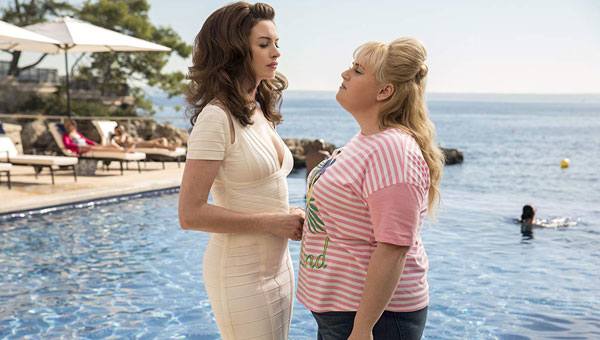The Hustle Review

Ironically, I’ve always found films about con artists to be quite reliable. Trustworthy even.
Con artist movies usually boast a healthy amount of levity, often spilling into outright comedy, as well as an inevitable twist. If the comedy falls short, the plot should save it, and vice versa.
This week sees the release of The Hustle, a film which shares its name with the grifter-based BBC show and acts as a gender-reverse remake of 1988’s Dirty Rotten Scoundrels.
In this version, Rebel Wilson plays Lonnie, a free-wheeling, low-aiming confidence trickster. She is inspired, and possibly forced by her growing notoriety in the US, to journey to Beaumont-sur-Mer, a wealthy resort on the coast of France.
En route, Lonnie encounters the more cultured Josephine (Anne Hathaway) who we first meet fleecing rich men in casinos. In this, Josephine is ably assisted by her servant and a corrupt policewoman, Inspector Desjardins (Ingrid Oliver).
Josephine is happily settled in France and knows she has a good thing going on. Sensing that Lonnie could jeopardise this, Josephine does everything she can to dissuade Lonnie from arriving at, then staying at, Beaumont-sur-Mer. She doesn’t feel threatened; she merely fears that Lonnie could bring unwanted attention. In Josephine’s words, a poacher shooting at rabbits can scare away big game.
The two initially try to work together, with Josephine agreeing to teach Lonnie her tricks. They then fall out and propose a wager: whoever can con half a million bucks out of an agreed mark wins. The mark in this case is a young tech billionaire (Alex Sharp).
Fans of the original will have an idea of how all this might play out, but suffice to say there are various twists as the con artists compete.
Wilson and Hathaway are clearly having fun in their roles and do have chemistry, but the film fell short of my expectations: the comedy isn’t quite funny enough and the plot isn’t quite twisty enough. And that’s coming from someone who hasn’t seen the original.
The continuous gags about Lonnie either being overweight or unattractive feel tiresome. As part of the recent welcome trend of all-female remakes, including Ghostbusters and Ocean’s 8, it is disappointing that any sense of female empowerment here feels submerged beneath a load of fat jokes.
Josephine meanwhile fits conventional beauty standards and we are therefore expected to believe she could easily seduce any man. The men incidentally are all depicted as either liars or letches.
I also take issue with what is as much a problem in the first film as this remake: the use of a disability to derive comedy, in this case Lonnie’s blindness. I don’t remember being this uncomfortable about comedy blindness since Charles Grodin’s routine in The Woman in Red.
Maybe I’m taking it all too seriously, or maybe it wasn’t entertaining enough to distract me from these thoughts. Some jokes raise a smile and it’s not bad enough to make you feel swindled, but it’s not rewarding either.
Conor Brennan